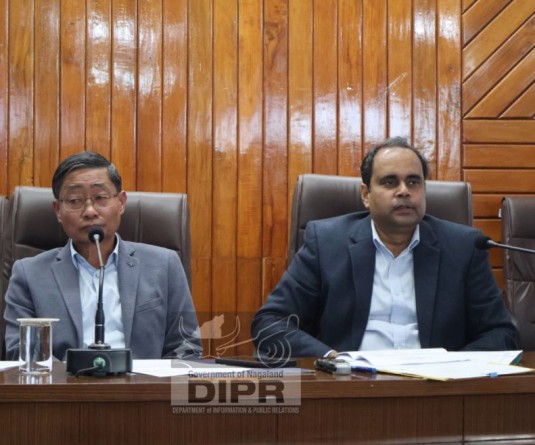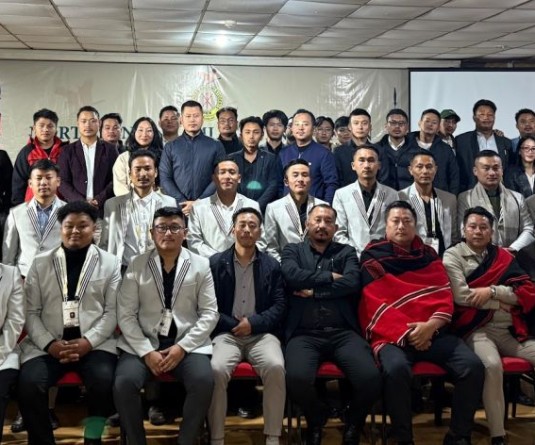
DIMAPUR, APRIL 1 (MExN): Governor of Odisha and former Nagaland State Chief Minister, Dr SC Jamir today stated that time has come to spell out the details of the Framework Agreement signed last year between the NSCN (IM) and the Government of India.
An article titled “Peace Accord Vis-A-Vis Future Challenges” by SC Jamir was released to the media today where he lamented that till date, the signatories have not shared the contents of the agreement, leading to “doubts and confusion.” He advised that there should be no ambiguity in an agreement which “promises to bring to an end decades of violence and bloodshed.”
Read Related Story…
He said that the agreement “cannot be outside the ambit of the Constitution of India,” and added that this needs to be stated unequivocally by the Government of India.
Jamir further urged that the contours of the Framework Agreement and the fine print of a final solution package should be discussed with and endorsed by representatives of all Naga tribes and the various Naga political groups. “In a democratic polity like ours, nothing should be done without the knowledge and consent of the people while deciding their political future...,” he said.
‘Nagas need to march with the times’
Jamir further lamented that each Naga political group is claiming the mandate of the people for their own. He said “historical fact should be accepted ungrudgingly by all.”
He asserted that as a “distinctive people,” Nagas have the “fundamental right to protect, preserve and promote their inalienable social, political and cultural endowment and to nurture and realize their unique socio-economic dreams and genuine political aspirations.”
Jamir however cautioned that the Naga people cannot afford to undermine the changes taking place in the world. “They have to live and march with the times,” he said, while encouraging the Naga people to ensure that “our knowledge, ideas, thinking, attitudes and outlook are reoriented, reshaped, reenergized and refresh in consonance with the changing times.”
Change, he reasoned does not mean “the death of the unique identity.” “On the contrary, change is synonymous with positive reorientation, intelligent reassessment, cogent revaluation and harmonious assimilation and seamless synthesis of the old with the new,” he added.
While being “progressive” and “dynamic,” Jamir however affirmed that the Naga people need to also preserve the core values which “project our unique identity and place in the modern world” and “facilitate in our socio-cultural and political progress.”
Read Related Story…
He stated that the younger generation of Nagas need to “shake off the dust of despair and frustration and take their destiny in their own hands ... and reshape our ideas and outlook to suit our present needs and future requirements.”
‘Do not repeat past mistakes’
The former Nagaland Chief Minister reminded that the Government of India had made mistakes in the past by treating the Naga issue as merely a law and order problem. This, he said should not be repeated. Meanwhile, he also advised the people of Nagaland to “take a practical view of things instead of deluding themselves with lofty ideals.” Acknowledging that an opportunity has been presented to shed past ideological baggage and confront reality, he stated that “a sense of pragmatism and benevolent accommodation by the big brother at this juncture will go a long way in resolving a problem that has defied solution for over six decades.”
Central assistance ‘necessary’ J
amir listed out the issues of concern in Nagaland state, from its complex socio-political and economic problems, to its underdeveloped economy, unemployment and the disproportionately large number of government employees. He deemed its “necessary” for the Government of India to provide a special financial dispensation for the overall development of Nagaland.
He advised that within the Framework Agreement, there needs to be a comprehensive and detailed blueprint for development of Nagaland, drawn up jointly by the Government of India and the Nagaland Government fully funded by the Government of India as Central projects.
“At the same time, the Central Government will have to vigorously monitor the expenditure of the State Government so as to prevent leakages and ensure efficient utilization of funds,” he added.
Make Article 371-A clear
He added that the “cloud of ambiguity” over some provisions of Article 371-A also needs to be cleared. “For instance, the phrase ‘land and its resources’ should unambiguously be interpreted to include natural gas and its by-products. Their exploitation by the State would, without doubt, add to its resources and make it economically more viable,” he claimed.






